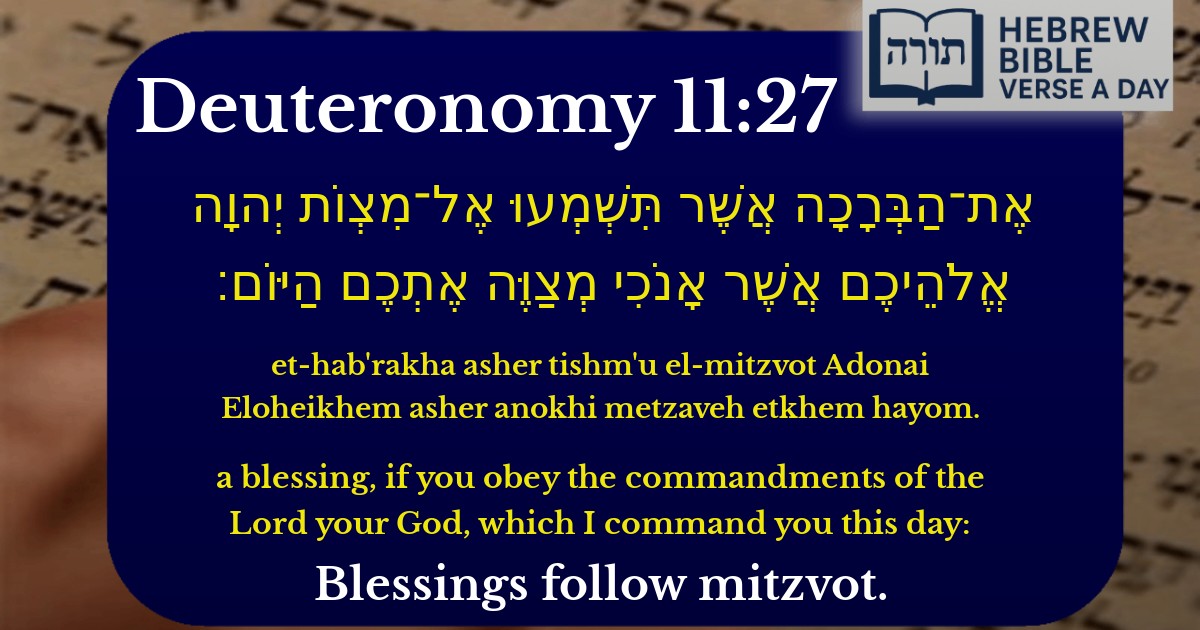Frequently Asked Questions
Q: What does Deuteronomy 11:27 mean?
A: Deuteronomy 11:27 teaches that blessings come from listening to and following Hashem's commandments. Rashi explains that this verse emphasizes the direct connection between observing mitzvot (commandments) and receiving divine blessings. The Torah is telling us that obedience to Hashem's will brings goodness into our lives.
Q: Why is Deuteronomy 11:27 important in Judaism?
A: This verse is fundamental because it establishes the principle of reward for mitzvah observance. The Rambam (Maimonides) discusses in Hilchot Teshuvah how proper intention in fulfilling commandments leads to spiritual and material blessings. It reminds us that Torah observance isn't just about ritual - it's a path to connecting with Hashem and receiving His goodness.
Q: How can we apply Deuteronomy 11:27 today?
A: The Sages teach that this verse applies in every generation. When we observe Shabbat, keep kosher, perform acts of kindness, or study Torah with sincerity, we open ourselves to Hashem's blessings. The Talmud (Makot 23b) explains that each mitzvah we do creates spiritual merit. This verse encourages us to see mitzvot not as burdens, but as opportunities to draw closer to Hashem.
Q: What kind of blessings does this verse refer to?
A: Traditional Jewish sources explain the blessings can be both material and spiritual. The Midrash (Sifrei Devarim) states they include peace, prosperity, and divine favor. However, the Ramban (Nachmanides) notes that the ultimate blessing is the spiritual reward of closeness to Hashem. The physical blessings mentioned are meant to support our ability to serve Hashem without distraction.
Q: Why does the verse say 'which I command you this day'?
A: Rashi explains that 'this day' teaches us that the Torah's commandments should feel new and relevant every single day, as if we received them today. The Sforno adds that this phrase reminds us that the opportunity for blessing through mitzvot is always present - each day brings new chances to connect with Hashem through His commandments.


The Nature of the Blessing
The verse states, "a blessing, if you obey the commandments of the Lord your God, which I command you this day." Rashi (Devarim 11:27) explains that the blessing is contingent upon listening to and fulfilling the mitzvot. The term "הַבְּרָכָה" (the blessing) is not merely a general reward but refers to specific material and spiritual benefits promised in the Torah for observing Hashem's commandments.
Obedience to Mitzvot as a Condition
The phrase "אֲשֶׁר תִּשְׁמְעוּ אֶל־מִצְוֺת" (if you obey the commandments) emphasizes attentive listening and active fulfillment. Rambam (Hilchot Teshuva 9:1) teaches that true observance requires both action and intent—performing mitzvot with understanding and devotion. The Sforno adds that the blessing is granted when mitzvot are performed with sincerity, not merely as rote actions.
"Which I Command You This Day"
The concluding phrase, "אֲשֶׁר אָנֹכִי מְצַוֶּה אֶתְכֶם הַיּוֹם" (which I command you this day), underscores the eternal relevance of the mitzvot. The Talmud (Eruvin 54b) interprets "הַיּוֹם" (this day) as a reminder that Torah should always feel as fresh and urgent as if it were given today. The Midrash (Sifrei Devarim 53) further explains that Moshe's role as the transmitter of the commandments is eternal, ensuring their continued authority.
Key Teachings from Orthodox Commentators